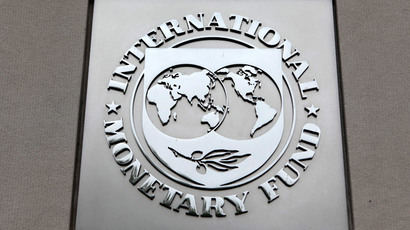The study, dubbed ‘Impact of International Monetary Fund programs on child health’, was published in the scientific journal Proceedings of the National Academy of Sciences on Monday.
The research involved at least 2.8 billion people, or about 50 percent of the world’s population, residing in 67 poor and middle-income countries from 2000 to 2005. The study looked at five factors that have an impact on children’s health, including water, malnutrition, shelter, sanitation, and access to healthcare. Researchers from Cambridge, Oxford, Amsterdam, and Waikato (New Zealand) universities contributed to the report.
The researchers analyzed how parents’ education can impact their children’s health, while examining the role the IMF plays in determining how countries distribute their resources to educational and public health programs. The authors found that it can be more difficult for parents to look after their children’s health under IMF reforms.
“In the absence of a [IMF] program, children living in an educated household have reduced odds of being malnourished by 38 percent compared with children of uneducated households,” the study says, as cited by AFP.
IMF programs diminished “the protective effect of education against child malnourishment by no less than 17 percent in rural contexts,” it said.
In the meantime, the authors admitted that, while they found links between parents’ education and their children’s health, they could make no direct connection between the IMF and child health.
Adel Daoud, one of the report’s authors from the Cambridge Judge Business School at Cambridge University, explained that “what we are observing in our study is a type of indirect effect.”
“Our study shows that in those countries with an IMF program, parents in rural areas are struggling a bit more to care for children,” he said. “In these groups, the levels of child health are indeed a bit lower than those exact same areas but without IMF programs,” Daoud told AFP.
An IMF spokesman told AFP that the fund hasn’t yet seen the report and, thus, can’t comment on it.
The IMF isan organization of 189 member-states that explains its mission as securing financial stability, encouraging sustainable economic growth and high employment, and reducing poverty around the world.
The organization has come under harsh criticism for flaws in its policies on several occasions, however. In 2014, the IMF’s Independent Evaluation Office (IEO) criticized the its advocacy of tax hikes and public spending cuts during the financial crisis in 2010, calling the proposals premature and ineffective in stimulating economic recovery.
READ MORE: ‘Not one euro more’ of austerity, says Greek Prime Minister
The IMF’s role in the dealing with Greece’s debt crisis has also been heatedly questioned. The fund has repeatedly called on Athens to cut its income-tax threshold and slash pensions to meet austerity requirements. According to a March 2017 report, the Greek economy suffered a setback in 2016, which was worse than expected.
1.2 million teens die every year – WHO
A separate report from the World Health Organization said at least 1.2 million teenagers die every year, while noting that nearly all of those deaths could have be prevented through health services, education, and social support.
“Road traffic injuries, lower respiratory infections, and suicide” have become the most prevalent causes of death among young people, the report released on Tuesday says.
“In many cases, adolescents who suffer from mental health disorders, substance use, or poor nutrition cannot obtain critical prevention and care services – either because the services do not exist, or because they do not know about them,” the report states.
According to Dr. Flavia Bustreo, WHO’s assistant director-general, “adolescents have been entirely absent from national health plans for decades.”
“Relatively small investments focused on adolescents now will not only result in healthy and empowered adults who thrive and contribute positively to their communities, but it will also result in healthier future generations, yielding enormous returns,” she said.
Source Article from https://www.rt.com/news/388527-imf-policy-children-health/?utm_source=rss&utm_medium=rss&utm_campaign=RSS
Related posts:
Views: 0
 RSS Feed
RSS Feed

















 May 16th, 2017
May 16th, 2017  Awake Goy
Awake Goy 




 Posted in
Posted in  Tags:
Tags: 
















